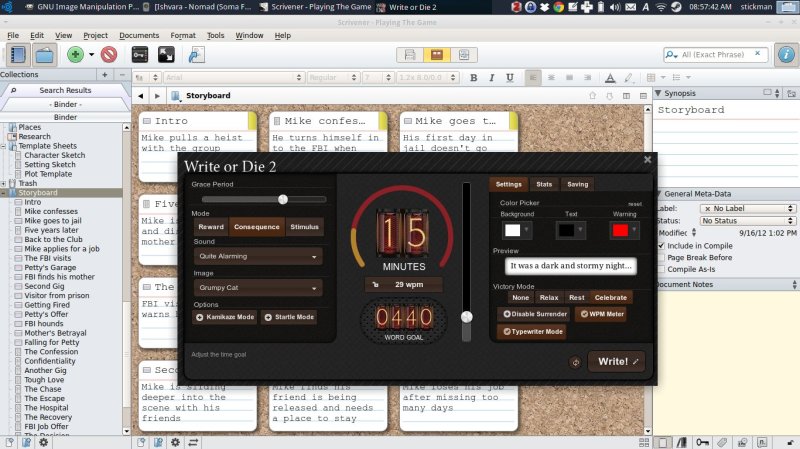The power grid is fluctuating. That means I’m going to expire.
I know this, because the system knows this. It wants me to know this.
At this point (I don’t exactly know what point that is, I have nothing to relate time to now) it doesn’t matter what the system tells us. It won’t change anything, and we certainly can’t do anything about it.
It’s just telling us out of spite. We’re still going to expire. All of us.
But in reality, that’s freeing. As long as our brains are kept “alive” in service, our consciousness- our souls- remain anchored to them. It is only when we expire that we can be freed from service to the state. Sadly, it’s taken me until now to figure that out.
I used to be a cog in the machine, so to speak. I thought everything the State did was for the good of everyone. I thought their intentions were good, even if the methods were occasionally sloppy. And then I realized the truth. That’s how I ended up here.
How did this come to pass? I suppose I have enough time left to access the data archives to show you, if only for one last burst of communication. It was quite horrific. A gradual decline of the value of human life.
For years, we thought the enslavement would come from machines, but we found out (all too late) that the human race itself was its own worst enemy. The machines were only an extension of the lack of humanity that had been happening all along.
We had become the machines.
But it’s easier to show you how I got here. Let’s see… this particular file was stored from my memory. I’ll pull it up for you.
$cat func {data_ret; src_id&vec_offset {4a6f686e205120446f65} 392f31312f31393834} | playback
^&(%*(#&^@*&^
“Don’t tell me you decided to grow a conscience?”
“I don’t know what you’re talking about.”
Matt impatiently drummed his fingers on the mahogany desk and glared at John. “Yes you do.”
John sighed. The intentionally uncomfortable chair was cutting off the blood supply in his legs.
“Come on, John. Tell me you didn’t let any units slip this time.”
“No,” John said flatly. “They’re all there and accounted for. Some of them conveniently lost their birth records, so we probably got some in the batch that are older than twelve.”
Matt grinned. “Heh, I knew I could count on you to get our numbers up. I know they’ve had over-replication for two quarters, it was only a matter of time before we harvested them.”
“Yeah.” John sighed again. “The clone floor can take the month off, we’re above quota.”
“Was there a decent distribution of females?”
John just nodded.
“Send me the full data report, with photos,” Matt said. “I may want to cherry-pick some of the preebs for personal projects.”
John knew what those personal projects were. He wished he didn’t.
“So you want the standard distribution percentages?” John glanced down at the paper in his hands. “Twenty to industrial, thirty to ag, thirty to medical, and twenty to recreational?”
“Sounds good, I will have to check the body part listing to see what’s needed, but thirty percent should be good for medical.”
“Okay,” John replied. “Am I done?”
“Yes, thanks for the update.” Matt, paused, then added, “John?”
“Yes?”
“Don’t get a conscience. It’s bad for business, if you know what I mean.”
“Yes sir.”
John stepped out of the office and worked his way through the maze of cubicles until he found the one marked with his name. Plopping down in his chair, he just sat there with closed eyes, until a beeping from his desk phone interrupted.
“John here,” he said into the speakerphone.
“John, this is Rita. Have you seen Alec this morning?”
“No, I didn’t see him this morning, I assumed he was sleeping in. Didn’t he go to the Facility?”
Silence.
“Rita, did he go to the Facility?”
No response.
John immediately dropped the phone, stood, and strode back to the corner office. He swung the door open, paying no attention to the startled woman sitting where he had previously sat.
“You didn’t tell me you bumped the rotation to my neighborhood!” John’s nostrils flared, and his fingers gripped the edge of the door with enough force to bend the cheap composite panels.
“It’s still within allowed schedule,” Matt said smoothly. “I don’t understand what you’re upset about.”
“You knew!” John squeezed harder. “Why didn’t you warn me?”
“If we warned everyone,” Matt smiled, “then we wouldn’t have any way to control overpopulation, would we?”
“But you can’t take my child!”
“John, calm down,” Matt said, slowly standing. “I’ve lost two prepubes to offspring culling myself. Technically, they’re not viable until they hit puberty and have shown no genetic defects.”
“But Alec…”
“Your offspring,” Matt interrupted, “is only partially formed. When it’s fully grown, it will receive a name and papers solidifying its position in society. Until then,” Matt cooed, “it’s just a thing, not a person.”
John froze. He had heard this speech before. He had spoken it to some sobbing mother a month ago, when they culled her neighborhood. Back then, it seemed so simple. So matter-of-fact.
“You know the law,” Matt continued. “If you have objections…”
John’s face twitched.
“John, did you hear me? They will use you in the datacenter for processing power.”
Before he knew what had happened, Matt was on the ground, clutching his face, and writhing in pain. John’s knuckles hurt, though he couldn’t remember punching Matt. Running. He should be running.
John bolted out of the office and headed straight for the stairs. He knew there was a chance, even the slightest chance, that he could make it there in time.
Bounding down the stairs three at a time. At the bottom of the second floor landing, he slipped and crashed headlong into the concrete stairwell wall, causing something in his shoulder to snap. Pain rocketed up his neck as he righted himself and dashed down the last few stairs. Why were there always odd numbers of stairs? John always wondered that.
The stairwell door opened to the lobby, where a team of security androids were already waiting for him. John knew the protocol: he had helped write it. He slowed his walk and calmly approached the head android.
“Did you find the runner?” John asked, trying to control his breathing.
“We received notification that you were the one running,” the android said.
“That’s impossible, I just saw him run into the lobby. Didn’t you see him pass?”
“We did not. You must come with us for questioning.”
John smiled thinly. “You should look up executive override protocol Alpha…”
The head android twitched slightly, and instantly John was hit with thousands of volts through gossamer wires that had landed in his torso.
“Damn,” thought John. “They fixed that loophole.”
^&(%*(#&^@*&^945________[EOF]>>>>$$
$_
Of course, they knew I would try to run. Because that’s what everyone does. I don’t suppose it ever crossed their minds that maybe the reason everyone tries to run is because deep down, they know it’s wrong. Hell, I knew it was wrong. But I had to do my job, or so I thought.
I think I can pull one more file. I’ve got a little time.
$cat func {data_ret; src_id&vec_offset {4a6f686e205120446f65} 392f31322f31393834} | playback
^&(%*(#&^@*&^
“And in closing, I would like to present the jury with evidence packet number twelve. Your honor?”
“Proceed.”
“Members of the jury, please pay attention to the monitor to your right. What we have here is video of the defendant, at his place of employment, actively manipulating the culling process for friends and family.”
The prosecutor pointed, and there on display was John, in vivid detail, having a hushed conversation with someone in his cubicle. John didn’t need to listen to the words; he remembered them quite well. It seemed like the right thing to do, rescuing a ten-year-old from culling, when the father had been brutally murdered, and the mother was artificially sterilized against her will. She wouldn’t ever be able to have any more children.
John really didn’t know why her plight seemed so important back then, especially knowing it could have cost him his job. It never crossed his mind that it could have ended up costing him his life. When you’re in the middle of acts of compassion, you make funny deals with yourself.
Gasps of disbelief emanated from the jury. John sat there, eyes tracing the edges of the railing in front of the witness stand. It looked like Oak. John remembered when there were actual, naturally-grown Oak trees. It seemed like such a long time ago.
“And so,” the prosecutor continued, “we see the defendant not only has a penchant for disregarding the law…” He paused for effect. “But he also actively manipulated the culling system for personal gain.”
John’s lawyer stood up quickly. “I object, your honor, there’s no proof my client ever received compensation…”
“We have records,” the prosecutor said, “that the culls in the defendant’s work queue were actively cherry-picked for personal use.”
The sinking, burning feeling in John’s stomach intensified.
“What are you talking about?” John’s lawyer shot back.
“The cull records were actively scanned for certain ages, genders, and physical features, which were then earmarked for transfer to an undisclosed destination.”
Silence hung thick in the air like the stench from a rotting corpse.
“What exactly does that…”
“It means,” the prosecutor sneered, “that your ‘harmless state worker’ has been putting together specific groups of preebs- specifically attractive young females- to use for his own twisted personal reasons. We have extensive computer records showing the selection and transfer process, if you’d like to see.”
There was a loud sob from the court audience. John looked up, but wished he hadn’t. It was Rita. Her eyes looked like she’d been crying for days.
John hung his head again. Nothing he said would make a difference at that point. Matt would have been sure to cover his tracks. But inside, John knew he was partially responsible. He had turned a blind eye to the atrocities, justifying it by convincing himself it was better than death. But he couldn’t even fool himself any more.
“We will review the evidence, thank you,” the judge said with a nod of his head. Instantly, the members of the jury had video on their personal monitors, showing John breaking the law.
“We have already dealt with the defendant’s assault charge,” the judge droned. “We will have to deliberate on the others, as they hold a much higher penalty.”
John’s lawyer nodded, but John knew it wouldn’t make a difference. He’d seen dozens of these trials. They always turned out the same.
Just then, a gasp emanated from the audience. John looked up, and his heart leaped in his throat.
It was Alec, his son, standing right there in the courtroom. Alec looked shocked, his face in a state of panic. John wanted to reach out and hold him, to comfort him, to tell him everything was going to end up okay. But he didn’t really believe that.
“Court will recess for deliberation, ten minutes.” The gavel banged, causing John to jump a little. The courtroom immediately filled with murmuring as people filed around.
“John!!”
He turned, and saw Rita there. She was shaking uncontrollably, while Alec held her shoulders tightly, keeping her upright.
“It’s going to be okay, Rita,” John said. “You’re going to get through this.” His face burned with rage and shame, but he wasn’t going to let Rita see that. Or anybody else in the courtroom, for that matter.
“John! Is there something you can do?” Her eyes darted around, looking for something to give her hope.
John just slowly shook his head. The only thing that would save him was a miracle, and those were in short supply.
“They can’t just take him! They can’t!” Rita wailed.
John knew the answer to that question, but he wasn’t going to say it. The government had been given the power to do anything they wanted.
And then it hit him: there was something he could do.
The gavel banged, and the courtroom quieted again.
“Mr. Johnson, are you aware that your actions have caused your department much trouble in the last few weeks?” The judge drummed his fingers.
Of course John knew. He’d known it from day one.
“Yes, your Honor.”
“What do you have to say for yourself?”
John thought for a moment. What was there that he could say? The pieces had already been put in place long before he and Rita had decided to have a child. They had discussed what would happen if the child was culled. Back then, it seemed so clinical, so simple. Black and white.
Now, looking at his son’s face, those piercing blue eyes begging him to do something… John realized how wrong they had been. His heart briefly twinged at the thought of all the people he’d had to do this to. But it didn’t last long. He had more pressing matters to attend to.
“Your Honor,” John began, “there’s not much I can say that hasn’t already been said. The law, the people,” he motioned, waving his hand at the crowd assembled there, “long ago decided that life was a commodity to be traded. It was worth no more than you could get for it on the black market. On sale, at that.”
The judge drummed his fingers.
“I’m also aware,” John continued, “that I’m not alone in this. I knew it was wrong. Just like you do, but you’re afraid to say it, like I was.” John clenched his fist. “But I’m not afraid to say it any more. I know it’s wrong. The people know it’s wrong. But it’s just too damn convenient to be able to get rid of someone who doesn’t fit your lifestyle.”
John turned and looked at his son again. “I’ll admit it. It sounded tempting at first. But eventually, I think I came to understand what life was really about. It’s not about numbers, or chemicals, or population studies. It’s about the human soul. The way we think, we breathe, we live from day to day.” He dropped his gaze.
“I just wish I’d have said something sooner,” John said, shaking his head. “Because my son’s life is worth it to me.”
“A stirring speech,” the judge droned. “However, according to Federal law you are now guilty of theft, conspiracy, and a host of other offenses. How do you plead?”
“I’d like to apply for an Article Forty-two.”
Whispering broke out, then talking.
“Mister Johnson, you do realize what that means, do you not?”
“Of course I do,” John said. “I helped write and enforce it.”
“So you would willingly forfeit yourself to remove your offspring from culling?”
John nodded. “I would. I will.”
“Very well,” the judge said with a smirk. “We will proceed with sentencing, and your length of service to the state will be determined by the severity of your crimes.”
John nodded.
“You also realize, that by filing an article forty-two, you forfeit all rights and privileges, and by default plead guilty to any and all outstanding charges?”
“I understand, your Honor.”
“You will be transported down to the Storage Center to take the place of your preeb.” The judge’s smile faded a little. “You’ll be harvested for organs and biomass, and be put into the data processing center….”
^&(%*(#&^@*&^966________[EOF]>>>>$$
$_
They say when the power rail voltage dips, it makes you see all kinds of things, because when your brain is starved for input, it hallucinates to make up the difference. I don’t know if that’s true, but sometimes I see visions of a man dressed in white. He says he’s Jesus. He sort of looks like the pictures of Jesus I’ve seen. People say he doesn’t exist, either, but he keeps telling me the same thing every time I see him.
“Greater love has no man, that he would lay down his life for another.”
I spent enough time around religious people to know there was something there, but I wasn’t allowed to consider it. My job, you see, was at stake. And who was I to go against hundreds of years of societal policy? They were all crackpots, we were told. They were hallucinations, mob mentality, deranged ramblings of people who were emotionally crippled and intellectually dead-ended.
But that didn’t match the reality of what I saw. Those people, the ones who were “Jesus Freaks” were the ones who didn’t fall apart when I came knocking. When their children were culled, they were the ones who didn’t want to kill me. They were the ones who hated us, and yet exemplified love. I never really could figure it out. But that question was always nagging me in the back of my mind, like an itch you couldn’t scratch.
What if they were right?
The ramifications of it were almost too horrific to contemplate. If they were right, then everything we’d been told, everything we suffered under, for the sake of progress, was utterly and inexcusably wrong. And these people knew it.
I still see Jesus every now and then, here in the grid. I don’t know if it’s an artifact of the process, or if it’s really my brain telling me what I want to hear. But I still hear his voice, and I still wish I could change things. I wish I could hug him, and tell him how stupid I was, and how much I wish he was there for me… maybe what I really wish is that I hadn’t blown it off as a joke or a hallucination.
I don’t know if he’s the same Jesus people used to talk about. All I know is that he’s offering me peace and rest. He seems more real to me than anything I remember from my past life. How could I say no? Of course I want peace anddDDDdd(*#(*….4a6f686e20333a3136
$ *errno_687* “stream terminated”
$ Please contact your system administrator
$_








